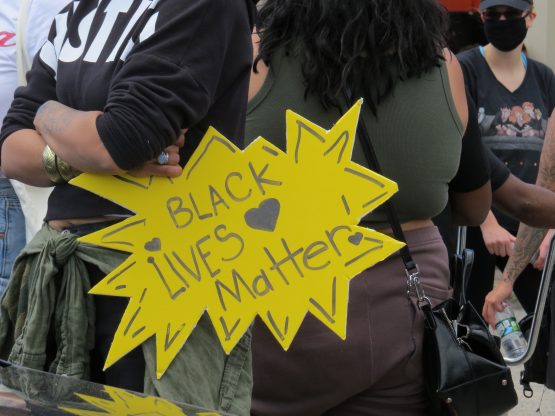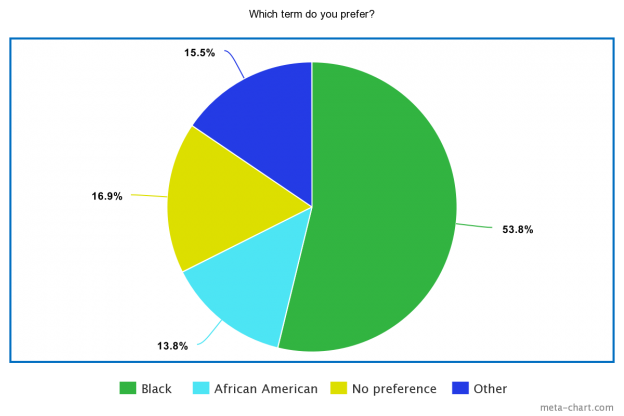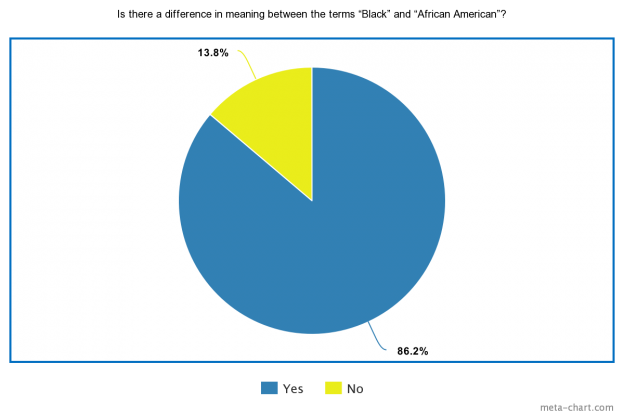
Conversations about race are becoming more prevalent in the media as the Black Lives Matter movement resurges and encourages people of the African diaspora to embrace the diversity within the Black community. This movement has made non-Black Americans more aware of an ongoing discussion within the Black community regarding the use of the terms “Black” versus “African American.”
While Black people in America and other parts of the world share the common experiences of racial discrimination and systematic oppression, it is unanimously understood that the Black experience is not monolithic. For this reason, among others, people prefer to claim their Blackness with terms that reflect their personal identities, which are shaped by their life experiences, ancestry and ethnicity.
Native New Yorker Dominique Neblung was born to Haitian parents and prefers to be identified as a Black woman.
“I find using the term African American for all Black people negates the experience, culture and to some degree, history of those of us who come from elsewhere,” Neblung said. “For example, my Haitian culture informs almost everything about me. I take pride in it and to just group every one of our race with that ‘catch-all’ term is an injustice.”
In agreement with Neblung’s reasoning, Dornzella Milligan said that the term “African American” when used in reference to descendants of enslaved Africans in America, enables division within the Black population. The former administrative assistant to the racial justice organizer with VCS Inc. explained that this division leads to a decrease in political autonomy and prevents unification among the Black community in the work of liberation, equity, and fair and just treatment.
“Systemic racism has a way of creating division among us so that we can’t really tell if these labels are a part of the connection you want to be a part of, or if you don’t want to be associated with Black Americans because of how we’re treated in this country,” Milligan said.
The United States Census Bureau recognizes Black or African American people as those “having origins in any of the Black racial groups of Africa.” This definition can pose a conflict for those that are a part of the African diaspora but do not consider themselves to be African because of their ethnicity or nationality.
“Though we as a people originate from Africa, some of us are culturally different from the experiences and traditions of African Americans,” Neblung said. “We have the commonality of being descendants of enslaved people and have suffered the remnants of systemic racism, our family and life experiences differ enough that it affects how we view and take on the world and our surroundings.”
A Gallup survey from 2007 concluded that there is “no strong consensus among the Black American community for how their racial group should be described.” In October 2020, among the 65 people who responded to an informal survey conducted by this reporter, the term “Black” was preferred over “African American” or other labels.

North Carolina resident Tanza Christie-Moye identifies as an African American woman even though she was born on the Caribbean island of Jamaica. She said the term “African American” speaks to the culture of her ancestors originally being from both Africa and America. Her choice is also based on the fact that she is a naturalized American citizen.
Contrarily, Stony Brook University student Goka Lee-Maeba noted a preference for the term “Black” as a citizen of Nigeria temporarily living in the United States. She said that the term “African American” is appropriate only when referring to an American of African descent through the Atlantic slave trade.
“You can be Black and not be African American,” Lee-Maeba said. “Black people live around the globe. They could be Jamaican American or Ghanaian American, or just African, or Caribbean. ‘Black’ has to do with your race, not ethnicity.”
While the participants had notably different preferences, it may be important to note that the majority acknowledged that there is a difference between the two terms.

“African American means you have roots that trace back directly to Africa,” said Skidmore College freshman Grace Burnett. “‘Black’ is more all-encompassing for those with family coming from other areas that were colonized, like Haiti,” with large populations of people with African ancestry.
Ndidi Massay was born in Nigeria and expressed a preference for the term “Black.” She noted the variety of cultures and experiences held by African Americans versus those with ethnicity from other countries in the African diaspora.
In reference to her own culture, Massay said, “It’s a different generational experience because we did not come from slavery. Our inherited culture is from Africa. It’s not from the enslaved experience here. That’s what I think the difference is.”
Elementary school teacher Brittany Barrow said she identifies as African American because the United States has been home to her family for several generations. Her response echoed that of the majority who do not recognize the terms “Black” and “African American” as synonymous. Barrow said “Black” refers to skin tone while African American refers to her family’s culture and origin.
“I’m Black and I’m African American. But it’s important to know not all Black people are African American,” Barrow said. “Those words are not interchangeable. I’m comfortable with both terms because I classify as both – as long as the B in ‘Black’ gets capitalized.”















Dr. B • Jan 24, 2021 at 2:10 pm
Professor M, one you said “Black wouldn’t students would rather sit on a stoop…”, I already could tell you’re a racist. And feel sorry for the students, white and of color, that you’ve ever taught and had the opportunity to pollute the minds of.
Black people are the only group in this country to be savagely taken from their homeland and brought here for brutal slavery, remnants that have built the systemic inequalities and the racial caste system we still have in America today. No other ethnic group can claim such a brutal history in this country. You may say, but slavery ended years ago! Yes, but when it ended, black people were not giving anything to start a new life with. While white people were building on generational wealth, black people had absolutely nothing and had to find their own way. Those who came here from other countries for a better opportunity were afforded land and finances to get started but the black people who were already here still had nothing. Still today, we see remnants of this in the separation of neighborhoods, schools, healthcare, criminal justice, and the list goes on.
Within the Black race, are ethnic groups who have their own powerful histories. For example, as a Haitian-American woman, I take pride in my country being the first free republic in the western hemisphere while slavery was still happening in United States, for being a safe haven for those escaping slavery and looking to be free.
Unless you share in the black experience, you cannot possibly understand why this question is important. I hope that you are retired and no longer poisoning the impressionable minds of our young people. We have to understand and accept the ugly truths of America if we can ever aim to get to a better place. And that means acknowledging the unfortunate reality that not all Americans share the same history in this country. Seeing difference is accepting existence.
**Drops mic**
JMurray • Jan 24, 2021 at 1:44 pm
Ken
Since you’re American first try explaining this to a police officer who may happen to have his knee pressed against your Black neck. Skin color in America cannot and will never be negated. We don’t cringe when we hear the term Italian American, Chinese American, Russian American, etc. Seems it only becomes an issue when The Black comes before American. Ask yourself why. Wake up!
Ken • Jan 24, 2021 at 9:12 am
Apparently, American Black’s are a “diverse group,” unlike what was said on the campaign trail. I am American first and black second. I do not know another country. My routes are American and who knows from where 300 years ago. It is important because American Black’s are American history. Notice I didn’t say “a part of American history.” It is also important to identify Haitian American, Jamaican American, Caribbean American, and African American because each has an experience and a story to share. My African friend from Ghana, and her experiences in the 90’s during the Civil war, and weapons devastating her country, separating families, and causing assive death is very different from my experience in the 90’s trying to get a second chocolate milk from the lunch lady.
I love this debate!
J Murray • Jan 23, 2021 at 10:43 pm
Professor M,
Make America great is the term. When you say make it great AGAIN that definitely points to a time when it wasn’t great for all. Hopefully making America great is on the horizon with someone who will be able to lead with intelligence and compassion for all. What transpired on January 6 will go down in infamy showcasing the ignorance that’s been festering post Bull Connor days. Clearly you are a throwback of that era. Your response to this article was evident that you may have been a part of this failed coup. It’s unfortunate that the label “professor” has been bestowed on you thereby giving you a platform to intentionally and recklessly spew your hatred and disdain for Blacks/African Americans on young impressionable minds. Crawl back under your rock of ignorance. Leave it up to us (when I say us you know who I’m referring to) to define who we are. The next time you visit a Chinese restaurant, buy French bread, purchase something of fine Italian leather …. and right here on American soil, you’re not thinking about the so called divisiveness of these labels. We know who and what you are.
Brittany B. • Jan 23, 2021 at 9:40 pm
To Professor M!
Let’s be honest, you are absolutely NOT a professor. However you do represent the decisiveness that is in America. Do you get offended when an Italian person clarifies they’re from Italy or do you just specifically hate when Black or African Americans like their ethnicity and race clarified?
The fact that you can feel so comfortable to dismiss the work of Black Americans, and Black people in general, is the reason why November’s election results were so historic. Your time is up and there is no room for your hate!
Professor M. • Jan 23, 2021 at 6:13 pm
Who really cares whether one identifies as Black, African American or anything else? It is this division that speaks loudly to why America will never again be a GREAT place to live? We are so caught up in this devising behavior that we forget that we are AMERICANS! Let us all contribute to America and making this country great again. I taught in New York at John Jay College of Criminal Justice for 20 years. I have come across students of many ethnicities. Black students would rather sit on a stoop drink a 40 spending the day listening to music and try to get a good grade. Asian, Middle Eastern and American students were entirely different! Even the Black professors in the African American Department did not publish any works that would show off their intellectuality. The person who argues in this article has no theoretical foundations to base his/her claims on. Might be he/she is African American? So we have elected the Great White Hope; Biden who is going to fail miserably and with Kamala Harris who ls not BLACK but like to play up this quasi truth (she is Asian as much as she is black) for political reasons no doubt and is a known plagiarist (copying from the great MLK) went to Howard a university known for low academic standards where if you went to their law school you can count on not being able to pass the Bar exams we as Americans elected ; thus placing us in a position of reaping the benefit of lost intelligence and borderline intellectual masturbation!
Please America take off the blinders, stop acting like sheep led by a false shepherd followed by a jack ass!
Mike • Jan 22, 2021 at 8:36 pm
There are white people like Charlize Theron who are African American.
Mike • Jan 22, 2021 at 7:55 pm
Not one of those interviewed call themselves Black American……